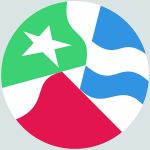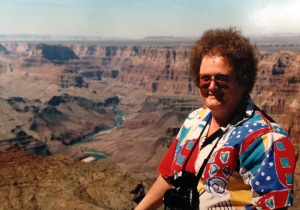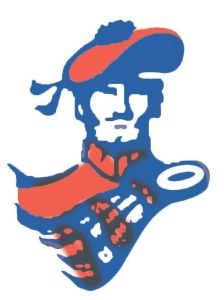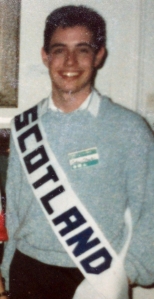 I’m scouring my shelves for something that triggers a memory from my El Paso days. Something tangible – some souvenir or memento, a photo, maybe – that might act as a kind of emotional rope ladder that I can cast down to the sense reservoir that lurks deep down in the memory cave.
I’m scouring my shelves for something that triggers a memory from my El Paso days. Something tangible – some souvenir or memento, a photo, maybe – that might act as a kind of emotional rope ladder that I can cast down to the sense reservoir that lurks deep down in the memory cave.
A book, maybe, that was inscribed by my yearbook class teachers. An LP that a pal bought & gifted to me the weekend before I set off. Something I took with me. Something I brought back. Something that was important then. Something that might find renewed importance now.
But there’s nothing. It’s like I’ve left everything from that part of my life behind.
I’ve written a bit already about my El Paso year, but I want to come at it from a different angle. I received an email the other day from Carol H, my south west El Paso YFU area rep, and before I reply to her I’d like to create a picture of the year I spent there, to reflect on it a bit, to try and see it with fresh eyes. I want to do justice to the response I send Carol, to acknowledge the impact that year made on my life, then and since, and to pay respect to the considerable part she played in all of it.
 The strongest image I have of Carol and the one that stays with me as I write this, is of her face, beaming rosy and round and bright, dimpled at the cheeks, crinkled at the eyes. A smile of genuine warmth, of affection all-encompassing, unconditional. Gentle, easy, happy, a powerhouse of positivity. In my mind, she’s wearing a short-sleeved blouse and slacks, big glasses frame her eyes; her short wiry hair reminds me of my mum’s.
The strongest image I have of Carol and the one that stays with me as I write this, is of her face, beaming rosy and round and bright, dimpled at the cheeks, crinkled at the eyes. A smile of genuine warmth, of affection all-encompassing, unconditional. Gentle, easy, happy, a powerhouse of positivity. In my mind, she’s wearing a short-sleeved blouse and slacks, big glasses frame her eyes; her short wiry hair reminds me of my mum’s.
Indeed, Carol was a kind of mother to all the exchange students in her area, even as we had been taken in as the guest sons and daughters of our host families. Carol’s job was to make sure we were all ok in our new temporary homes, host families too, to see that we were happy and settled, to deal with any upsets, to find resolutions to difficulties, to act as intermediary, as counsellor, and above all, to make sure that we all made the most of this incredible transformative gift that we’d been given – the opportunity to live in a foreign culture, many thousands of miles distant from our own families, for a whole year.
 And she was great at it. Carol’s house was a regular little united nations of French and Dutch and German and Japanese teenagers where we gathered for pool parties, pizza parties and Christmas parties to share our experiences and observations about life in Texas, our highs and lows, to gossip and moan, and above all to delight in the quirks and perks of our host city and its generous, colourful, beautiful, crazy people.
And she was great at it. Carol’s house was a regular little united nations of French and Dutch and German and Japanese teenagers where we gathered for pool parties, pizza parties and Christmas parties to share our experiences and observations about life in Texas, our highs and lows, to gossip and moan, and above all to delight in the quirks and perks of our host city and its generous, colourful, beautiful, crazy people.
Carol listened to it all without prejudice. She took time to know us, to love us all equally. She recognised the things that made us who we were – and who we were becoming – and she gave each of us our place in this home from home. She made us all feel that we belonged – together, in her house, in our new country, and in the world as individuals. How many people in your life can you genuinely say that about?
 The world has shrunk a lot since 1987. Even more since the 1950s when YFU (Youth for Understanding) was set up. Its aim was, and still is, to foster peace and unity in the world through sharing values and experiences between cultures after the mass slaughter of the Second World War. Initially operating between Germany and the USA, school aged students travelled from one country to the other and lived for a year, learned the language and ways of life, and shared something of their own with the families who hosted them. The programme quickly spread to most of the rest of western Europe, Japan, China and other countries in east Asia, South America. The fall of the Berlin Wall in 1989 opened up Eastern Europe, and now the list of participating countries runs to around 50 – the UK sadly but unsurprisingly no longer among them.
The world has shrunk a lot since 1987. Even more since the 1950s when YFU (Youth for Understanding) was set up. Its aim was, and still is, to foster peace and unity in the world through sharing values and experiences between cultures after the mass slaughter of the Second World War. Initially operating between Germany and the USA, school aged students travelled from one country to the other and lived for a year, learned the language and ways of life, and shared something of their own with the families who hosted them. The programme quickly spread to most of the rest of western Europe, Japan, China and other countries in east Asia, South America. The fall of the Berlin Wall in 1989 opened up Eastern Europe, and now the list of participating countries runs to around 50 – the UK sadly but unsurprisingly no longer among them.
The UK has never really “got” the whole cultural exchange thing – we’re happy to go overseas and take the best of everything that’s on offer, but when it comes to allowing foreigners to share our houses, share our lives for a whole year… well, that’s just not very British, is it.
The spirit of YFU is based on openness, inclusivity, respect and, fundamentally, intercultural understanding. None of these things could describe the UK over the last few years, especially since the vote to leave the EU, the increasingly rabid anti-immigration, anti-foreigner rhetoric at large in society, and our government’s moronic ideological pursuit of an isolationist political agenda and the imagined good old days of Empire. I doubt many YFU alumni would have much truck with Trump either.
I’m not sure this is the world that any of us imagined when we got with the peace, love and understanding programme. How could it be? Everybody knows the war is over, everybody knows the good guys lost. The old evils that YFU’s founders sought to eradicate with knowledge are back with a vengeance, bolder and more empowered by ignorance. The structural injustices and inequalities never went away. We’re left with ourselves and the challenge to be better versions of who we are, the best we can imagine ourselves to be.
And who is that person? Who did I become? And who would I have become if not for my year with YFU?
Looking again at the stuff on my shelves, in the corners of my cupboards where I keep the treasures and mementos from my past, nothing at all exists from my El Paso days – partly, it seems, because I had yet to become the person I am now. It sort of feels like the whole thing happened to a different person, someone I have in part disowned.
 I knew nothing of myself as a 15 year old. I knew even less about the world around me. Travel was a few summer trips to France and Tenerife with my parents, visits to uncles and aunties in England. The furthest I had ever gone on my own was a 15 mile bike ride in the countryside. At school, I was reasonably good at music, English, geography; hated maths, science. I was learning French but had never met a French person. I harboured vague notions of one day going to music college, but nothing definite, nothing you could call a career plan or a vocation.
I knew nothing of myself as a 15 year old. I knew even less about the world around me. Travel was a few summer trips to France and Tenerife with my parents, visits to uncles and aunties in England. The furthest I had ever gone on my own was a 15 mile bike ride in the countryside. At school, I was reasonably good at music, English, geography; hated maths, science. I was learning French but had never met a French person. I harboured vague notions of one day going to music college, but nothing definite, nothing you could call a career plan or a vocation.
That all changed when my dad came home from work with a company circular offering the children of employees the chance to win a scholarship with YFU. It was presented as a kind of competition – and competitions were a big thing in our family, my Nana was a master at them. It was the kind of competition where you had to write a few hundred words describing how you would deal with a year in a foreign country. What the challenges might be, how you would deal with them, what you would bring to a “cultural exchange”, what you think you might take from it. Kind of thing. I worked at it over several nights with my mum, drafting and redrafting my answers, writing them out neatly to fit as much as I could into the boxes on the form. No online applications back then; no word processors.
I was invited to London for an interview. My dad and I flew down first thing and made our way to a tall, thin terraced house in Kensington where we were welcomed by a friendly middle aged professional couple. I remember I was wearing a pastel yellow shirt and grey chinos bought for the occasion. There was a girl there, a year or so older than me – Susan something? They interviewed us separately, posing various scenarios and what ifs, much like the application questions: Would you miss your family. How do you cope with boredom. How do you deal with disappointment. It was all very friendly, very relaxed, but utterly terrifying – my first ever interview! Dad and I flew back later that evening after a trip to Piccadilly Circus and a mooch around the shops. It was already the most exciting thing I’d ever done.
I learned a week or so later that I’d been unsuccessful. I had made a good impression but ultimately I was considered too young – I was only 15 after all – and not mature enough to cope with the emotional demands of living so far from home with a family of strangers. Perhaps I could consider applying again next year but there was no guarantee the scholarship would be available.
Turns out I coped poorly with disappointment. I was crushed. I had a horrible life at school, every single day was an unpredictable gauntlet of relentless, merciless bullying from every quarter, and this seemed like an opportunity to escape. I’d had a glimpse through the door of another life beyond all that. In those few weeks I had built up the scholarship to become a real thing in my mind, more than some magical adventure or fantasy.
And then, a few weeks later, there was a twist of fortune. My dad’s employers, a global engineering brand, were funding five YFU scholarships throughout their operations across the world. Someone, in Japan of all places, had withdrawn from the programme and suddenly a scholarship had become available – was I still interested?
My first month in El Paso was a blur, a roar, a flurry of sense impressions. I’d learned about “culture shock” in my three day orientation before I set off, but here I was living it. Everything was new. My relatively young, immature and impressionable, still developing brain was inundated and overloaded with new sounds, smells, sensations, flavours, people, places, conventions – right down to the unfamiliar alloy of the coins. Every orienting device, every familiar face, every recognisable trace of my life hitherto was thousands of miles away. Even language – a supposedly shared language – was untrustworthy. I don’t think I spoke more than five words that first month.
I do remember arriving in El Paso. I flew Glasgow to London, London to New York, and a rendezvous under the swooping Googie vaults and arches of Eero Saarinen’s gorgeous TWA pavilion at JFK with a cadre of seersucker-suited YFU reps lined up on the walkways to guide us onward. A brief walk outside in the summer heat – to see New York! – was like being punched in the chest with a steaming hot fist of air. From New York to Dallas and more blue-striped seersuckers. I fell in with a group of Spanish students who spoke a more easily comprehensible variety of English than my teenage-mumbled Scottish accented mouth music, full of gulped down vowels and bitten off consonants, stuttered out at roughly Mach 2 at low volume. Nobody had a clue what I was saying.
I made myself understood eventually to be directed to an airport hotel, and woke the next morning with the sun rising red and dry and low from my bedroom window, ready to take the last leg of my journey across the desert to my new home in El Paso. I had no idea what was waiting for me.
There’s a photo of me stepping into the arrival lounge, all crewcut hair and Lennon shades – fresh-faced, rosy-cheeked and utterly gobsmacked. Everyone is there. There’s the marimba band. The Bel Air Taco Band. There’s a bagpipe band. I learn later the school I’m going to attend had been requesting a Scottish student for years – their mascot’s the Highlander – and I was the first there’d been on the YFU programme, so they sent the full welcoming committee to greet me off the plane. Even the pilot comes over and asks – me, a Scottish person – if I know his cousins in Perth and he gives me a pair of souvenir TWA wings. There’s the school head teacher, the cheerleaders, the dancers. There’s the Payans, the family I’m going to stay with. There’s the YFU people, and there’s Carol. It’s crazy.
But beautiful. And something I need to celebrate more in my life.

My recollections of El Paso are mostly positive. But I think back to that day at the airport and the hopes of the family and the school who welcomed me into their community. I think about my family back home, sending me off into the wild blue yonder with hopes for my future. I think about the values of the YFU project, and being accepted as an ambassador for my culture. And I have to ask myself if I ever lived up to any of that. Did I share enough? Did I learn enough? Did I do enough to add to the stock of understanding in the world?
A few months after I returned from my year in El Paso, I was given another amazing opportunity to attend a week-long residential seminar at the European Youth Centre in Strasbourg. The theme of the week was about asking how YFU can better use the media to achieve its aims. While I was there, I got to know one of the organisers, a Belgian journalist called Patrick, himself a YFU alumnus and who in fact had spent his year in El Paso. He recognised my Bel Air letterman jacket and he knew Carol. It was like we were related. We took a photo, with the intention of sending it to Carol, which I have in an album somewhere. Who knows if a copy ever made it to Carol.
I googled Patrick, who’s still working as a journalist, and was curious to note that – some forty years later – he still includes the year with YFU in his professional biography, whereas I have erased all trace of that experience from my CV. He even proudly lists being, as I am too, an Hononary Citizen of El Paso.

There’s nothing of that in my life, no mention of my scholarship, my year of study at a foreign high school, anywhere publicly. I might say to people when I get to know them a bit, but otherwise it’s like I’ve tried to bury the memory. Even my photo albums are squirrelled away in my dad’s attic, unopened for at least a decade.
It’s a startling realisation. But writing this, I want to change how I feel about that year. I want to embrace it and celebrate it again. YFU was part of the continuum, rather than an exception, of who I am now: the far-travelled me, the curious me, the me who writes, the me who adapts, who bends, who shapes himself to circumstance. Resilient. Resourceful. Independent. But also, bullied, bruised,  never quite comfortable in my own skin. It is also part of the ‘me’ who continually has to go outside of himself, to lose himself, in order to find himself again; who permanently carries around a sense of displacement, of unbelonging – and ironically, my experience of going to school in the town I grew up in gave me that much more than travelling halfway across the world ever did.
never quite comfortable in my own skin. It is also part of the ‘me’ who continually has to go outside of himself, to lose himself, in order to find himself again; who permanently carries around a sense of displacement, of unbelonging – and ironically, my experience of going to school in the town I grew up in gave me that much more than travelling halfway across the world ever did.
I can’t speculate on the kind of person I might have become if not for that year; the best I can do is to embrace the person I am today, who exists as he is because of these people, my mum and dad included, Carol, the Payans, everyone who made that year happen, and to thank them for the privilege.



